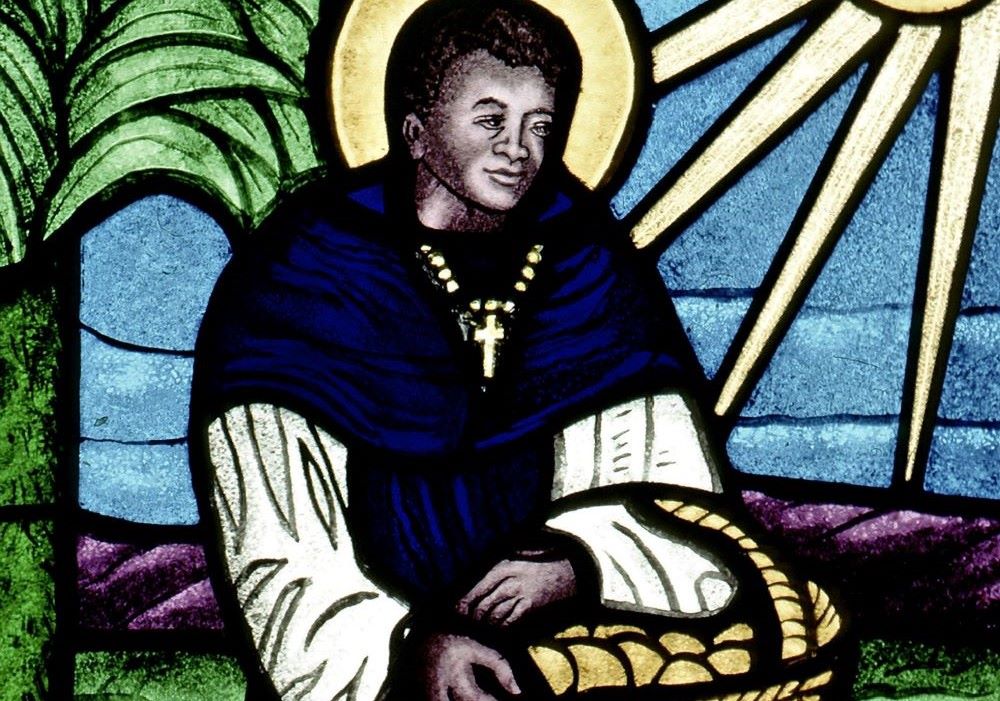
St. Martin de Porres is depicted in a stained glass window at Holy Rosary Church in Minneapolis. The feast day of St. Martin, a Dominican friar, is Nov. 3. (CNS/Crosiers)
Today is the feast day of San Martín de Porres of Peru, the illegitimate child of Anna Valezquez, a formerly enslaved Afro-Panamanian woman, and a Spanish nobleman who abandoned the family after Martín's younger sister was born. Martín is the first person of African descent from the Americas to be declared a saint.
While Martín is said to have had miraculous powers of bilocation, the ability to commune with animals and to heal, service was his specialty. Once, he encountered a sore-ridden beggar and brought him to his own bed in the monastery. When the superior reprimanded him for allowing a dirty, contagious stranger into the cloister, Martín replied that he could easily wash sheets, but not the guilt of ignoring the poor. Disregarding the difference between his rank as a brother and that of his superior, Martín replied, "Compassion, dear brother, is preferable to cleanliness." Martín might be a good interpreter of today's Liturgy of the Word.
In our reading from Deuteronomy, we hear one of many renditions of Moses instructing the people about God;s law. While there are more than 630 mitzvot (commandments) in the law, Moses summarized them with the "Shema," the prayer/creed we hear today that begins, "Hear O Israel!" This creed reminds all who proclaim it that when they put their whole heart into love of God, their primary desire will be to act in God's name in all times and circumstances. Today's Gospel makes that more concrete.
One day, some Pharisees and Sadducees were debating with Jesus about taxes and the circumstances under which a man could get rid of his wife. An unnamed scribe (an official with the legal power to transcribe and promulgate scriptural and legal documents) came to Jesus asking about the greatest of all the commandments. As a scribe, he knew the law better than most. Was he sincere? Testing Jesus? Trying to make a point in front of a crowd? Who knows? No matter, Jesus improvised Moses' teaching. He recited the Shema and interpreted it, specifying that that love of neighbor so closely resembles love of God that they are inseparable and summarize every dimension of a God-fearing life.
By agreeing with Jesus, the scribe took Jesus' side in the previous debates. In contrast to the Pharisees, who tried to protect the faithful from any semblance of mixture with foreigners, including payment of taxes (Mark 12:14-17), the scribe agreed that love was the only core commandment. In contrast to the Sadducees, members of the upper class who oversaw temple sacrifice, he agreed that love outshines every kind of sacrifice or ritual. By implication, the scribe who had the responsibility to write decrees of divorce, also stood with Jesus on that question of the mutual responsibility of husbands and wives (Mark 12:18-27). In a rather ironic exchange, the scribe complimented Jesus on his interpretation of the Law and Jesus affirmed that the scribe was not far from God's reign.
Moses, the scribe and Jesus shed light on today's selection from Hebrews. The author, presumably Paul's coworker Priscilla, points to Christ as the supreme and final priest and sacrifice. Jesus' sacrifice? Offering himself to humanity and remaining forever as the way for humanity to meet God.
What might St. Martín tell us today about love of God and neighbor?
St. Martín, a porter, barber-surgeon, healer and friend of the poor. was never ordained. He was a brother whose life preached in a way that few others have — or might even wish to do. He understood that love of God implies love of everyone and everything that God loves. He understood that love of Christ implies giving oneself unreservedly for God's beloved. He rankled more than one of his brothers and contemporaries with his freedom to put the law of love above every religious practice and restriction. He offered a frightening example because, like Jesus, he went where the Spirit led him rather than confine himself to "how it should be done." He made the word of God as real and effective as a two-edged sword. (Hebrews 4:12)
What might St. Martín tell us today about love of God and neighbor?
If he wrote English, he might tell us to capitalize the word Neighbor, recognizing that we meet God's love, needs and prophecy in others. He might remind us that in our haste to complete important work or to be respectable, we may miss the fact that compassion is far more important than achievement or being law-abiding — no matter the goal.
Although Martín would never say it himself, he was an icon of Christ, a living, loving incarnation of all that it means to be the body of Christ. As we approach the U.S. election, he would encourage us to ignore our reputations and fears as we dedicate our whole heart, soul and strength for love of God and Neighbor.
Advertisement
